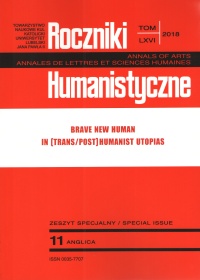The Logic of “Both/And” in The Matrix: Eutopian Mapping in a Posthuman World
Abstrakt
Logika „zarówno/i” w Matriksie: Utopijne mapowanie w posthumanistycznym świecie
Artykuł poświęcony jest analizie utopijnych kontekstów dialogu z posthumanizmem, jaki prowadzi pierwsza części filmowej trylogii Matrix. Artykuł stawia tezę, że dialog filmu z posthumanizmem oparty jest na logice “zarówno/i”, zgodnie z którą dwie przeciwstawne perspektywy zestawione są ze sobą w sposób niewykluczający się. Z jednej strony, film można odczytać jako krytyczną dystopię, w której ucieczki od koszmaru posthumanistycznej przyszłości należy upatrywać w powrocie do „myślącego podmiotu” z tradycji kartezjańskiej. Z drugiej strony, film zachęca widza do poważnego potraktowania radykalnie anty-antropomorifcznych przesłanek posthumanizmu. W takim odczytaniu Matrix stanowi utopijną odpowiedź na ekologiczną apokalipsę, do której doprowadził gatunek ludzki.
Bibliografia
Badmington, Neil. “Theorizing Posthumanism.” Cultural Critique 53.1 (2003): 10–27. Print.
Barnett, P. Chad. “Reviving Cyberpunk: (Re)constructing the Subject and Mapping Cyberspace in the Wachowski Brothers’ Film The Matrix.” Extrapolation 41.4 (2000): 359–374. Print.
Bartlett, Laura and Thomas B. Byers. “Back to the Future: The Humanistic Matrix.” Cultural Critique 53 (Winter 2003): 29–46. Jstor. Web.
Barton, Kimberly. “Revolutions in The Matrix: A Cue Call for Reflexive Sociology.” Matrix in Theory. Eds. Myriam Diocaretz and Stefan Herbrechter. Amsterdam: Rodopi, 2006. 53–72. Print.
Belsey, Catherine. Critical Practice. London: Methuen, 1980. Print.
Callus, Ivan. “New Theory? The Poshumanist Academy and the Beguilements of The Matrix Trilogy.” Matrix in Theory. Eds. Myriam Diocaretz and Stefan Herbrechter. Amsterdam: Rodopi, 2006. 291–310. Print.
Dragonoiu, Dana. “Neo’s Kantian Choice: The Matrix Reloaded and the Limits of the Posthuman.” Mosaic: A Journal for the Interdisciplinary Study of Literature 40.4 (2007): 51–67. Print.
Fitting, Peter. ”Unmasking the Real? Critique and Utopia in Recent SF Films.” Dark Horizons: Science Fiction and the Dystopian Imagination. Eds. Raffaella Baccolini and Tom Moylan. New York and London: Routledge, 2003. 155–166. Print.
Freeland, Cynthia. “Penetrating Keanu: New Holes, but the Same Old Shit.” The Matrix and Philosophy: Welcome to the Desert of the Real. Ed. William Irwin. Chicago and La Salle: Open Court, 2002. 205–215. Print.
Hayles, N. Katherine. How We Became Posthuman: Virtual Bodies in Cybernetics, Literature, and Informatics. Chicago and London: University of Chicago Press, 1999. Print.
Herbrechter, Stefan. “The Posthuman Subject in The Matrix.” Matrix in Theory. Eds. Myriam Diocaretz and Stefan Herbrechter. Amsterdam: Rodopi, 2006. 249–290. Print.
Hutcheon, Linda. A Poetics of Postmodernism: History, Theory, Fiction. New York and London: Routledge, 1988. Print.
Kurzweil, Ray. “The Human-Machine Merger: Are We Heading for the Matrix?” Taking the Red Pill: Science, Philosophy and Religion in The Matrix. Ed. Glenn Yeffeth. Chichester: Summersdale Publishers, 2003. 220–234. Print.
The Matrix. Dir. Andy Wachowski and Larry Wachowski. Perf. Keanu Reeves, Laurence Fishburne and Carrie-Anne Moss. Warner Bros. Pictures, 1999. Film.
Moylan, Tom. Scraps of the Untainted Sky: Science Fiction, Utopia, Dystopia. Boulder: Westview, 2000. Print.
O’Riordan, K. “Changing Cyberspaces: Dystopia and Technological Excess.” The Matrix Trilogy: Cyberpunk Reloaded. Ed. Gillis S.. Wallflower Press, 2005. 138–150. Print.
Lawrence, Matt. “Mind and Body in Zion.” Introducing Philosophy through Pop Culture. Eds. William Irwin and David Kyle Johnson. Chichester: John Wiley & Sons Inc. 2000. Ebook.
Sargent, Lyman Tower. “Do Dystopias Matter?” Dystopia(n) On the Page, on Screen, on Stage. Ed. Fátima Vieira, Newcastle upon Tyne: Cambridge Scholars Publishing, 2013. 10–13. Print.
Stratton, Jon. “’So Tonight I’m gonna party like it’s 1999’ Looking Forward to The Matrix.” Matrix in Theory. Eds. Myriam Diocaretz and Stefan Herbrechter. Amsterdam: Rodopi, 2006. 27–52. Print.
Vieira, Fátima. “The concept of utopia.” The Cambridge Companion to Utopian Literature. Ed. Gregory Claeys. Cambridge: Cambridge University Press, 2010. 3–27. Print.
Copyright (c) 2018 Roczniki Humanistyczne

Utwór dostępny jest na licencji Creative Commons Uznanie autorstwa – Użycie niekomercyjne – Bez utworów zależnych 4.0 Międzynarodowe.





